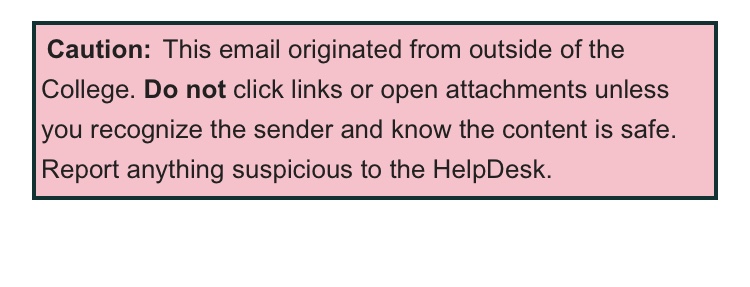Phishing Combatted with Caution Notice
Emails from outside sources warn Dickinson users of potentially harmful links or attachments due to the “growth of criminal activity over the Internet,” stated Kevin Truman, director of infrastructure systems and information security, in a Jan. 24 email.
The new “caution” labels on emails appeared at the beginning of this semester, as students reported scams from Microsoft emails.
According to Truman, Dickinson’s Library and Information Systems (LIS) has “SPAM” solutions to capture “malicious email content,” although the technology does not catch all phishing emails. “When a malicious email does get through our filters, it is incumbent upon the recipient to use caution,” Truman stated.
Students have mixed reactions on the effectiveness of the caution notice.
Ariana Patterson ’22 stated, “I don’t find the caution emails particularly useful because they get put on stuff that’s relevant for activities for organizations you’re in.” Patterson said that scam emails coming from Dickinson accounts do not have caution labels on them.
Lucas Curran ’22 said that he has received lots of “caution” emails within the last month. “I don’t care anymore, I was a little confused at first, but now it seems like every email says ‘caution.’”
Truman said that LIS will implement more security tools in the near future. For anyone whose accounts may have been compromised, Truman said they should contact the LIS Helpdesk and there is “helpful information on the LIS website about Phishing and computer Malware.”





Alice Andley • Mar 25, 2019 at 1:09 am
Phishing is the biggest threat to this computer world so it is very essential to keep secure yourself from the phishing attack that for that you should have a proper idea about it also can visit https://uaedatarecovery.com/data-recovery-for-apple-devices/ for more information in detail.